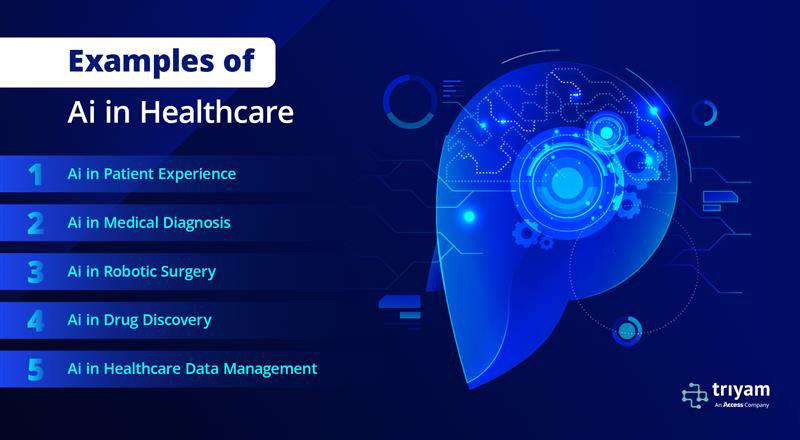Artificial Intelligence (AI) is reshaping how healthcare systems manage data, making processes more efficient, improving data accuracy and ultimately boosting patient care. With the healthcare sector dealing with massive volumes of information, AI provides cutting-edge tools to organize, interpret, and safeguard this data.
This article examines how AI is revolutionizing data management in healthcare, along with its advantages, challenges, and outlook.
What is AI in Healthcare Data Management?
AI in healthcare data management involves using machine learning (ML), natural language processing (NLP), and other AI technologies to organize, process, and analyze medical data. This includes electronic health records (EHRs), medical imaging, patient histories, and billing information. AI automates repetitive tasks, uncovers insights from complex datasets, and ensures compliance with regulations like HIPAA.
AI gained traction in the early 2000s due to advanced technology and data analysis. Three key factors converged:
- Increased computing power
- Big Data in Healthcare
- Smarter AI algorithms
Experts saw AI’s potential to improve diagnostics, personalize treatments, and boost efficiency. According to Statista report, the global AI healthcare market is projected to reach $187 billion by 2030.
Key Applications of AI in Healthcare Data Management
- Electronic Health Record (EHR) Optimization
AI streamlines EHR systems by extracting relevant information from unstructured data, such as doctors’ notes or patient forms, using NLP. This reduces administrative burdens and allows healthcare providers to focus on patient care. For example, AI can categorize patient data to identify trends, improving diagnosis accuracy. - Data Security and Compliance
With rising cyber threats, AI enhances data security by detecting anomalies in access patterns and flagging potential breaches. AI-driven encryption and monitoring ensure compliance with regulations, protecting sensitive patient information. - Predictive Analytics for Better Outcomes
AI analyzes historical data to predict patient risks, such as readmissions or chronic disease progression. By identifying high-risk patients, healthcare providers can intervene early, reducing costs and improving care quality. - Medical Imaging and Diagnostics
AI processes medical images, like MRIs or X-rays, to detect abnormalities with high precision. Machine learning models trained on vast datasets can spot patterns that may be missed by human eyes, aiding early diagnosis. - Billing and Claims Processing
AI automates coding and billing, reducing errors and speeding up claims processing. This minimizes claim denials, optimizes revenue cycles, and improves operational efficiency.
Future of AI in Healthcare Data Management
The future of AI in healthcare data management is promising. Emerging trends include:
- Interoperability: AI will enable seamless data sharing across healthcare systems, improving collaboration.
- Real-Time Analytics: Advanced AI will provide instant insights for faster decision-making.
- AI-Driven Telemedicine: Integration with telehealth platforms will enhance remote patient monitoring.
- Federated Learning: This approach allows AI models to learn from decentralized datasets while preserving privacy.
As AI technology evolves, its adoption will accelerate, driven by advancements in computing power and regulatory frameworks.
How to Leverage AI for Healthcare Data Management?
Healthcare organizations looking to adopt AI should:
- Assess Needs: Identify areas where AI can address specific challenges, such as EHR management or billing.
- Choose Scalable Solutions: Opt for AI platforms that integrate with existing systems and support growth.
- Train Staff: Invest in training to ensure seamless adoption and maximize AI benefits.
- Partner with Experts: Collaborate with AI vendors specializing in healthcare to ensure compliance and efficiency.
- Monitor Performance: Regularly evaluate AI systems to ensure accuracy and address biases.
Benefits of AI in Healthcare Data Management
- Improved Efficiency: AI automates time-consuming tasks, such as data entry and record sorting, freeing up staff for critical tasks.
- Enhanced Accuracy: Machine learning reduces human errors in data analysis and diagnostics, ensuring reliable outcomes.
- Cost Reduction: By streamlining workflows and predicting resource needs, AI lowers operational costs.
- Personalized Care: AI tailors treatment plans based on individual patient data, improving health outcomes.
- Scalability: AI systems handle growing data volumes, making them ideal for large healthcare networks.
Challenges of Implementing AI in Healthcare Data Management
Despite its potential, AI adoption faces hurdles:
- Data Privacy Concerns: Ensuring patient data security while using AI requires robust safeguards.
- Integration with Legacy Systems: Many healthcare facilities use outdated systems that are incompatible with AI tools.
- High Initial Costs: Implementing AI solutions demands significant investment in infrastructure and training.
- Regulatory Compliance: Navigating complex regulations like GDPR or HIPAA can slow AI deployment.
- Bias in AI Models: Poorly designed algorithms may produce biased outcomes, affecting care quality.
AI is revolutionizing healthcare data management by enhancing efficiency, accuracy, and patient care. While challenges like privacy and costs remain, the benefits of AI—streamlined operations, predictive insights, and personalized care make it a game-changer. As technology advances, healthcare organizations that embrace AI will stay ahead, delivering better outcomes for patients and providers alike.
Ready to transform your healthcare data management?
Explore Triyam’s healthcare data management solutions today and unlock the potential for smarter, more efficient care delivery.


